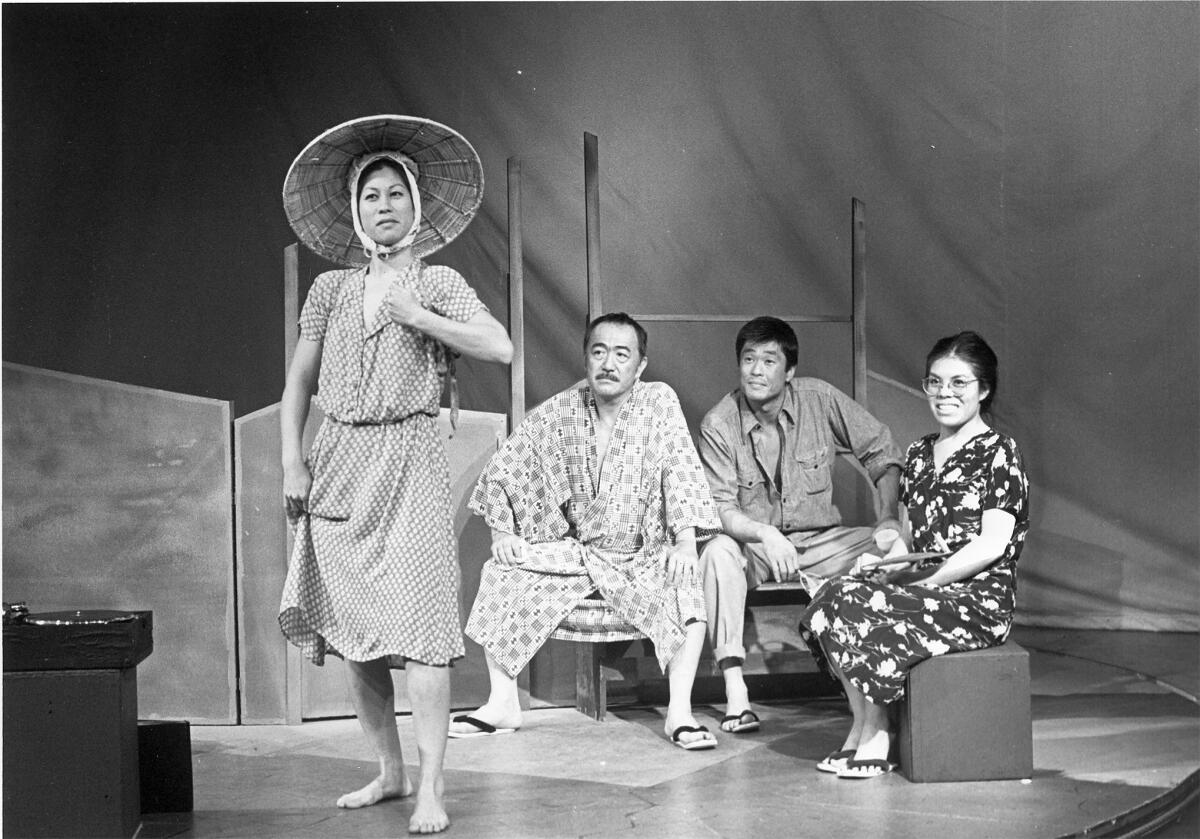Wakako Yamauchi, a pioneer playwright of the Japanese American experience, dies at 93
- Share via
Wakako Yamauchi, the pioneering Japanese American playwright, short story writer and poet whose 1977 play “And the Soul Shall Dance” shed light on the harsh realities of the early 20th century immigrant experience, has died. She was 93.
Yamauchi died at home in Gardena, granddaughter Alyctra Matsushita said.
“And the Soul Shall Dance,” Yamauchi’s first play, was commissioned by the L.A.-based Asian American theater company East West Players and adapted from Yamauchi’s short story of the same name. It won the Los Angeles Drama Critics Circle Award for new play and was filmed for PBS that year. Playwriting grants from the Rockefeller Foundation and the Mark Taper Forum followed, and Yamauchi went on to distinguish herself as an early and influential figure in Asian American theater.
Tim Dang, former artistic director of East West Players, cited Yamauchi as one of four Asian American playwrights — with Edward Sakamoto, Jon Shirota and Frank Chin — who could be considered pioneers for future generations. She was the only woman of the group, and her plays featured another theatrical rarity: strong female protagonists.
Her work cast an unflinching look at cultural identity, and she was the first playwright to truly mine the Issei (first generation) and Nisei (second generation) Japanese American experience, Dang said. Of nearly five dozen Asian American theater companies in the country, Dang added, most have used “And the Soul Shall Dance” in their inaugural season.
“When East West first started in 1965, there weren’t a whole lot of plays written about the Asian American experience, so we did a lot of European works … Shakespeare and Chekhov,” Dang said. That began to change when the company’s co-founding artistic director, Mako, began reaching out to writers in the community, including Yamauchi.

“She was a woman of principles, and I think that reflects in her writing and her willingness to share her story,” said Matsushita, who lived with Yamauchi during the last few years of her life. “And she was stubborn, in a good way. There is a bravery to being so stubborn.”
Yamauchi was born Wakako Nakamura in Westmorland, Calif., in 1924, the daughter of first-generation Japanese immigrants. Her parents worked in punishing conditions as itinerant farmers in the Imperial Valley.
During World War II, when Yamauchi was 17, her family was sent to an internment camp in Poston, Ariz., for a year and a half. She wrote for the camp newspaper alongside the now renowned (but then unknown) writer Hisaye Yamamoto. The two women maintained a lifelong friendship.
There are many, many writers of the '30s, Japanese Americans or Asian Americans — very fine writers who died in obscurity.
— Wakako Yamauchi in 1986
Yamauchi married and later divorced Chester Yamauchi, with whom she had one daughter, Joy.
Yamauchi’s difficult life in the Imperial Valley and at Poston informed much of her writing, which often grappled with racism, intolerance and injustice.
“She was introspective, but she was always very gracious and she was philosophical,” said Ross Levine, a friend and fellow writer who met Yamauchi in the 1970s as her playwriting career was taking off. “She always considered herself a country girl. … She really was not a person looking for the limelight in any way.”
The limelight found her, however, and she sometimes used it as an outspoken critic of the marginalization of Asian American writers.
“Ethnic stories seldom get published in white magazines, in the mainstream. … There are many, many writers of the '30s, Japanese Americans or Asian Americans — very fine writers who died in obscurity,” she told The Times in 1986 when her play “The Memento” opened the 20th anniversary season of East West Players.
East West Players was a champion of Yamauchi’s work, staging plays that included “The Chairman’s Wife,” which dramatizes the life of Madame Mao; “12-1-A,” which refers to her family’s address in the internment camp and examines life for a group of detainees; and “The Music Lessons,” about a Japanese widow and her family living in the Imperial Valley in the 1920s.
“And the Soul Shall Dance” remained the crowning achievement of Yamauchi’s career. The play was adapted from a short story published in 1974 in “Aiiieeeee! An Anthology of Asian-American Writers.” It was set on a farm in the Imperial Valley in the 1930s and depicted the hardships endured by Japanese immigrant farmers as relations with Japan soured leading up to the war.
“It is a beautiful play, grounded in an absolutely authoritative knowledge of who these people were and how they lived,” wrote Times theater critic Dan Sullivan in 1977 when the play opened at East West Players. “Ms. Yamauchi knows them so well that she can show their contradictions without confusing us.”
Yamauchi is survived by her sister, Yuki Sugiyama; her son-in-law, Victor Matsushita; her grandson, Lucas Matsushita; and granddaughter, Alyctra Matsushita and her fiancé, Peter Chisom.
The biggest entertainment stories
Get our big stories about Hollywood, film, television, music, arts, culture and more right in your inbox as soon as they publish.
You may occasionally receive promotional content from the Los Angeles Times.








